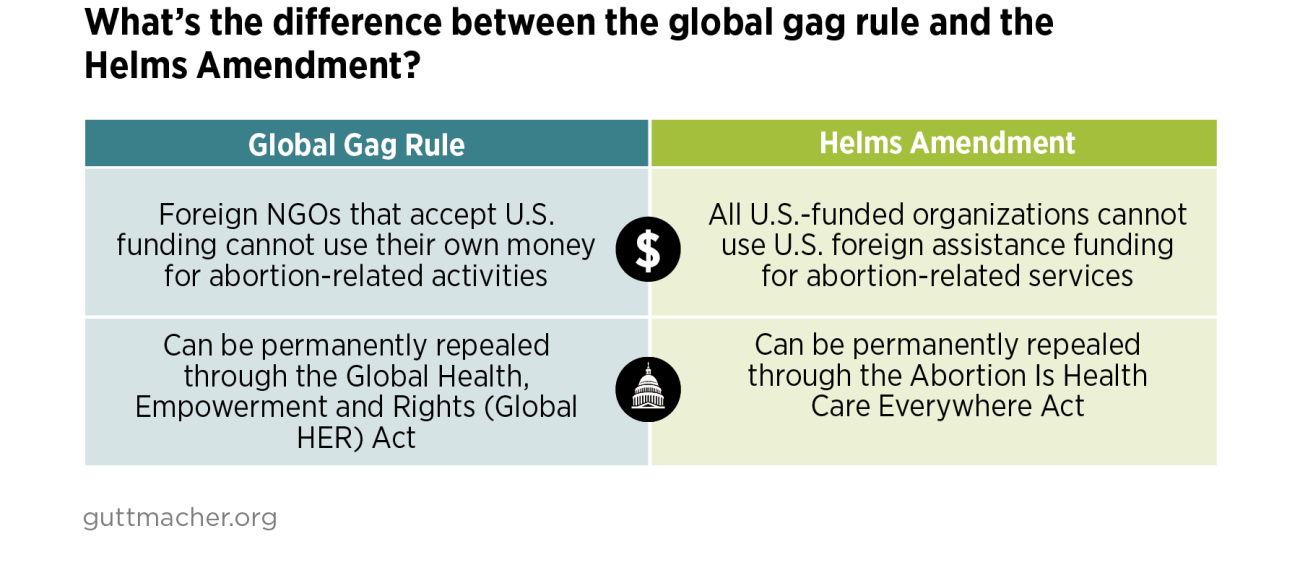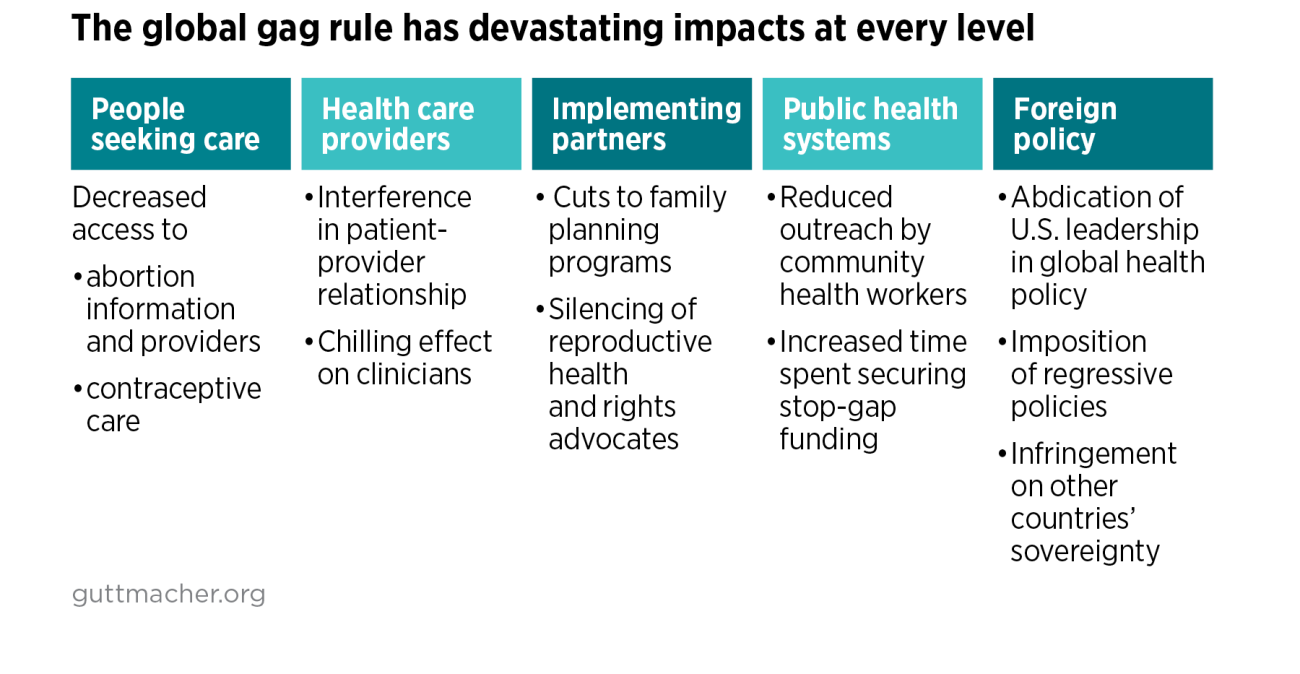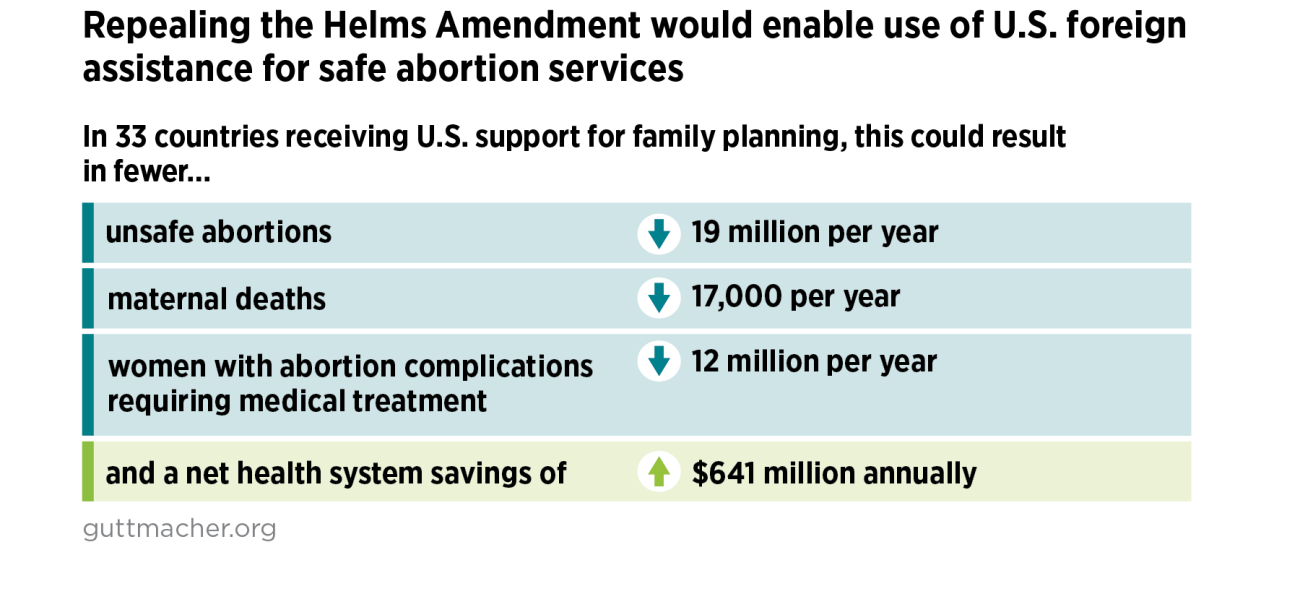Abortion is an essential health care service and should be accessible for everyone, in every country. Two U.S. policies—the “global gag rule” and the Helms Amendment—have interfered with the provision of and support for abortion and other reproductive health services in numerous low- and middle-income countries for decades. These policies have harmed people’s health, damaged health care systems and undermined long-term U.S. foreign policy objectives, with disproportionate effects on those already facing oppression and marginalization. It is long past time for federal policymakers to permanently repeal both policies.
The Global Gag Rule and the Helms Amendment: Dual Policies, Deadly Impact
From the series Federal Policy Snapshots
How the global gag rule and Helms Amendment work
- The “global gag rule” prevents foreign nongovernmental organizations (NGOs) from using their own, non-U.S. funds to provide abortion services, information, counseling, referrals or advocacy. Since it was first created in 1984, the policy has historically been put in place by Republican presidents and rescinded by Democratic ones.
- The Helms Amendment, in effect, prohibits U.S. foreign assistance funding from supporting safe abortion services around the world. This draconian policy applies even in countries where abortion is legal, resulting in the United States undermining local health systems, providers and patients by failing to support the right to access a legal health service.
- While these two policies are sometimes conflated, they are distinct, as they involve different sources of funding and different types of organizations. However, they both have disastrous consequences and work together to create an environment hostile to basic human rights and access to health care.

Impact of these restrictions
Global gag rule
- The global gag rule is bad public policy on every level. To date, there is no evidence of any positive developments (for instance, an increase in contraceptive access or a decrease in maternal mortality) stemming from the global gag rule or its expansion.
- Research from numerous external groups, as well as the Trump administration’s own State Department, has consistently demonstrated that the global gag rule is harmful in multiple ways, both in the short and long term. Specifically, the policy interferes with individuals’ access to care, silences and harms clinicians, stymies programs and advocates, strains public health systems and undermines U.S. foreign policy.
- For example, the global gag rule has led to fewer community health workers in areas of Uganda, as recruitment and training programs for these workers are funded by foreign NGOs. Because those workers provide family planning services for underserved communities, this loss will likely result in decreased access to contraceptives and, in turn, more unintended pregnancies.

Helms Amendment
- The Helms Amendment prevents the United States from supporting access to the full range of essential health services in other countries, including abortion. This is particularly shameful and problematic in low- and middle-income countries—where the United States has a strong presence through other health and development programs—as abortion rates tend to be relatively high and many abortions are unsafe (i.e., not performed by a trained provider or not using a method recommended by the World Health Organization).
- The failure of the United States and other countries to fully support access to safe abortion services contributes to the more than 35 million unsafe abortions that occur annually in low- and middle-income countries, leading to 23,000 preventable maternal deaths.
- If the Helms Amendment were to be repealed and health care systems around the globe were supported—instead of hindered—by U.S. policy, recent Guttmacher data show there could be 19 million fewer unsafe abortions, 17,000 fewer maternal deaths and 12 million fewer women who have abortion-related complications requiring medical treatment each year. The overall number of maternal deaths from unsafe abortion in these countries would decline by 98%.

What policymakers can do
Although President Biden has rescinded the global gag rule through executive action, that is only a short-term and partial solution to the long-term problems caused by these two devastating policies. To fully address the harms of the global gag rule and the Helms Amendment, the Biden-Harris administration and Congress must take steps to permanently revoke them by:
- Passing the Global Health, Empowerment and Rights Act, which would end U.S. interference in what NGOs do with their own money. Enacting the bill would prevent future presidents from unilaterally reinstating the global gag rule via executive action and end the policy’s intermittent use.
- Passing the Abortion Is Health Care Everywhere Act, which would repeal the Helms Amendment, allow the United States to support the full range of sexual and reproductive health services that people around the world want and need, and have major health and economic benefits for numerous countries.
- Removing language reinforcing the global gag rule and the Helms Amendment from annual appropriations bills.
Acknowledgments
This fact sheet was made possible by the David and Lucile Packard Foundation. All opinions are those of the authors and do not necessarily reflect the positions or policies of the donor.
From the series Federal Policy Snapshots
Reproductive rights are under attack. Will you help us fight back with facts?
Read More
U.S. Policy Resources on Abortion
The Unprecedented Expansion of the Global Gag Rule: Trampling Rights, Health and Free Speech
Guttmacher Policy Review
